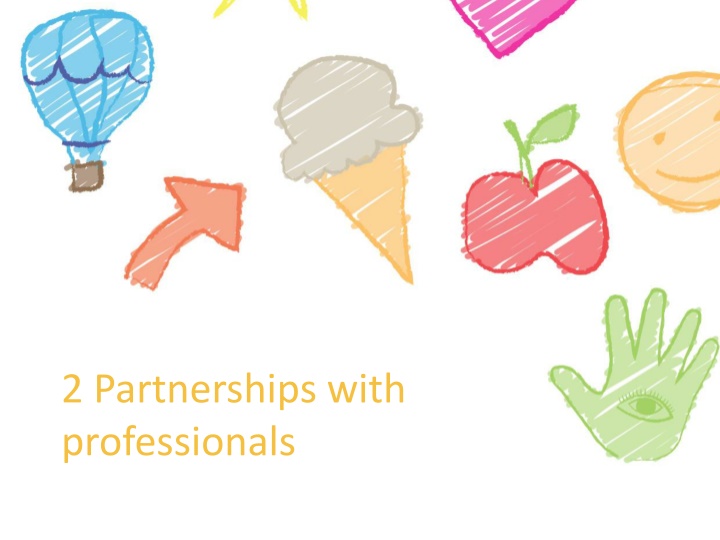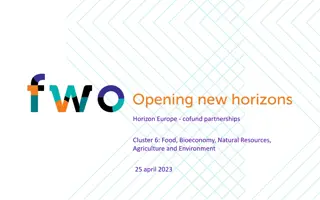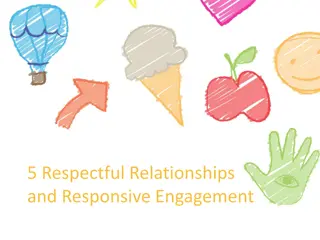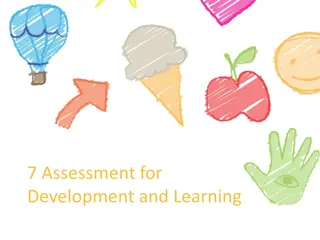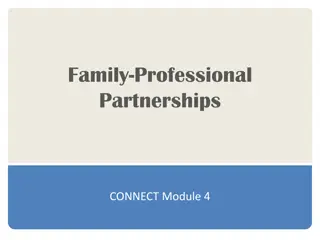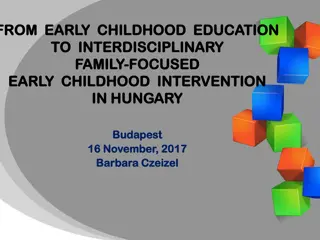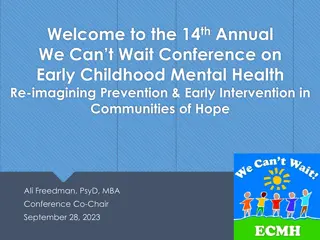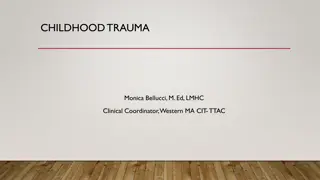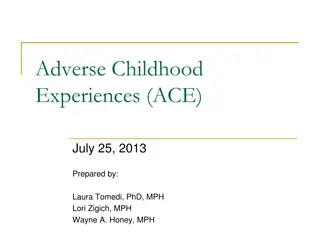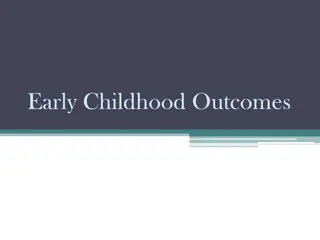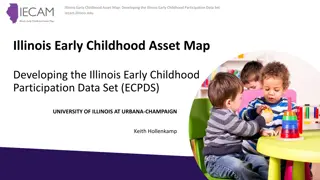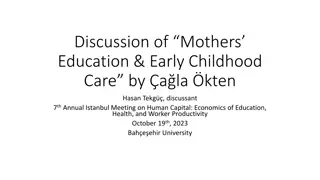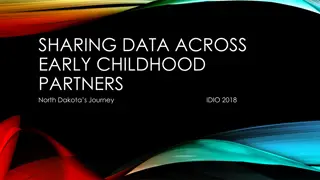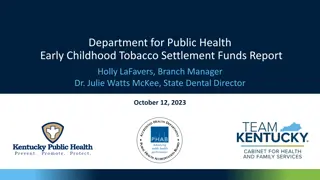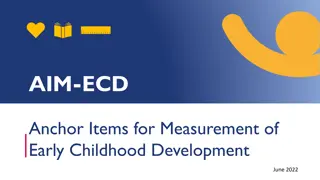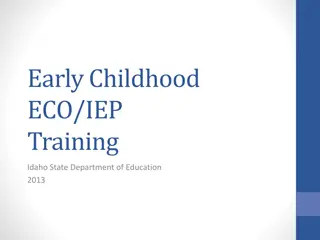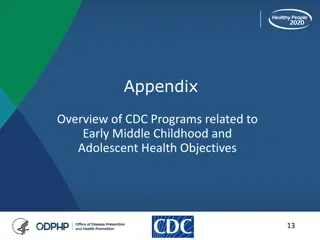Building Effective Partnerships with Early Childhood Professionals
Partnerships with professionals in the early childhood sector are crucial for promoting children's holistic development. Collaboration, respect, and open communication are key aspects of successful partnerships. Examples of such partnerships include maternal and child health services, long day care centers, and support services for children with disabilities. While there are risks involved, the benefits of these partnerships far outweigh the challenges, leading to improved outcomes for children and families.
Download Presentation

Please find below an Image/Link to download the presentation.
The content on the website is provided AS IS for your information and personal use only. It may not be sold, licensed, or shared on other websites without obtaining consent from the author.If you encounter any issues during the download, it is possible that the publisher has removed the file from their server.
You are allowed to download the files provided on this website for personal or commercial use, subject to the condition that they are used lawfully. All files are the property of their respective owners.
The content on the website is provided AS IS for your information and personal use only. It may not be sold, licensed, or shared on other websites without obtaining consent from the author.
E N D
Presentation Transcript
2 Partnerships with professionals
Partnerships and Collaboration Partnerships with other professionals are ongoing long- term relationships based on shared values and commitment Collaboration is working together to achieve shared goals Effective partnerships always involve collaboration Professionals may collaborate for brief or extended periods of time and for a specific purpose or for a number of purposes
Partnerships and early learning professionals Partnerships between early childhood professionals are characterised by: respect for each other s experience and expertise open and ongoing constructive communication trust clarity about roles agreed goals or purpose openness to different views and perspectives and willingness to learn from others commitment to building relationships collaboration with families and children
Examples of Partnerships Maternal and child health services (which can take several forms) Long day care centres Early learning programs Family day care Sessional kindergartens Playgroups and supported playgroups Occasional care Before and after school and vacation care services A range of services for children with a disability or developmental delay Specialist support services Schools
Risks Families may get conflicting or confusing information Relationships between families and professionals may break down There is little or no consistency and continuity in children s experiences Educators don t get the support they need The child and family are not supported well
Benefits of partnerships Holistic approaches to children s learning and development More individualised responses to children and families, for example when there is a need for an assessment or to be seen by a specialist More efficient and quicker responses to urgent needs, such as financial assistance, housing or medical treatment More inclusive practices Transitions for children that support continuity in their learning and development Improved access to services Less likelihood of conflicting or confusing advice or information Families not having to continually retell their story
Benefits of partnerships Partnerships are especially important for children with disability, developmental delay or additional learning needs, those from at-risk families, gifted children and those who have experienced abuse and neglect Working in partnership ensures that goals and approaches are compatible and that everyone operates with a more complete picture of the child and family
Benefits of partnerships (cont.) A more holistic, complete and integrated picture of the child, which makes it easier for professionals to give every child the support they need to meet their learning and development needs and build on their strengths Opportunities to learn from each other to be exposed to different perspectives and new information and to critically reflect together Making the best use of skills, knowledge and experience and applying their collective expertise to their work More opportunities to participate in professional development
Benefits of partnerships (cont.) The satisfaction of sharing their particular expertise and knowledge with others Opportunities for coaching, being mentored, mentoring and reducing professional isolation A more powerful voice coming from a broader and larger network and therefore a stronger base for advocacy and greater potential to influence policy, practice and general understanding within the community
Benefits of continuity Continuity between family childrearing practices or traditions and those practices found in early childhood settings Continuity of professionals relationships with the child and family over time Continuity of practice/pedagogy between settings, such as between a kindergarten and a prep class
Transitions and stress Transitions can be complex and challenging for young children and their families, particularly for children with trauma Partnerships and collaboration among professionals, children and families can reduce stress and contribute positively to the transition process
A positive Start to School initiative The initiative: recognises the critical nature of early learning and development and the importance of support to provide continuity of learning builds on the understanding that transition is a process, not a point-in-time event, and starts well before, and extends far beyond, the first day of school identifies strategies for facilitating and supporting children s adjustment to the changes they will experience, and creates a common planning approach for families, services and schools to access and adapt to local contexts
Results of Effective transitions increased likelihood that children s new experiences take account of and build on their prior knowledge and experience greater understanding by Prep teachers of curriculum and children s learning and development in prior-to-school services and vice versa Prep teachers having accurate up-to-date information about each child families and children feeling more positive and secure about starting school prior-to-school educators feeling more valued for their knowledge stronger connections and relationships among educators and service providers more comprehensive planning for children with disability starting school
partnerships each service s context is unique and this will impact on partnerships the more isolated a professional or service is the more important it is to take small steps to establish partnerships it is important to have a designated person whose central role is to bring about and strengthen collaboration and partnerships it is important to have commitment and support from managers and leaders to provide required resources
Practices that contribute to partnerships communicating openly and constructively with other professionals working toward shared goals valuing the expertise of other professionals and making referrals when appropriate leading collaboration and partnerships and encouraging others to lead committing to working together to advance knowledge about children s learning and development
Privacy Ethical and legislative obligations related to families and children s privacy, both in written records as well as conversations about a child with other professionals Victorian privacy legislation includes: Information Privacy Act 2000 Health Records Act 2001 Public Records Act 2002 Commonwealth Privacy Act 1988 may also apply to early childhood services
Communication strategies Communication strategies that support collaboration include: holding meetings that encourage open communication and consideration of all perspectives embedding formal processes to support collaboration rather than it being an add-on sharing information
benefits of Planning with other professionals Educators take account of children s experiences in different settings Professionals gain multiple perspectives on a child s learning and development Plans are based on shared comprehensive assessments of children s learning and development, which provides a more holistic and complete picture of the child
Making referrals Collaboration leads to professionals referring children and families when the skills and expertise of others are called for and working closely with those professionals when needed Positive, respectful relationships with other professionals may require confronting biases or misconceptions about their work
Leadership and partnerships Capable leadership is essential and includes recognising that partnerships may involve: bringing together different philosophies and expertise dealing with varying expectations confronting hierarchical power and status differences working through different views about roles and responsibilities
Commit to working together Many professionals and services are involved in formal or informal partnerships with research institutions and government departments. These partnerships help to translate research into policy and practice In these partnerships early childhood professionals help to produce new knowledge as they share their valuable expertise and experience
